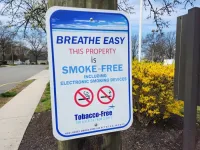(Press-News.org) A new study, published in IOP Publishing’s journal Environmental Research: Health, reveals that Indigenous people in the Amazon Basin are twice as likely to die prematurely from smoke exposure due to wildfires than the broader South American population. Regions in Peru, Bolivia and Brazil are identified as particular hotspots for smoke exposure, with mortality rates rising to as high as 6 times that of the general population.
The results show that smoke from wildfires in South America account for approximately 12,000 premature deaths every year from 2014 to 2019, with approximately 230 of these deaths occurring in Indigenous territories. Exposure to harmful smoke particles is found to be much higher during the Amazonian dry season, from July to November each year, when wildfires more than double the increase in PM2.5 concentrations.
Dr Eimy Bonilla, lead author of the study, says: “While Indigenous territories account for relatively few fires in the Amazon Basin, our research shows that the people living in these territories experience significantly greater health risks from smoke particles, compared to the general population.”
Previous research in the field focuses on the health impacts of countries on larger scales or is heavily reliant on hospital admission data. This does not accurately highlight the impact on people living in indigenous territories as they are often located much closer to the fires, are exposed to smoke particles for longer periods of time, and lack access to appropriate medical care, hygiene materials, and clean water. The new study, led by researchers at Harvard University, uses a combination of atmospheric chemical transport models and an updated concentration response function to estimate the rate of premature mortality for Indigenous populations exposed to high concentrations of PM2.5.
In recent years, the rate of biomass burning in South America has surged. This surge is driven by forest degradation due to human activity (such as mining, logging, and agricultural land use) as well as variations in climate conditions. Wildfires release tiny smoke particles called PM2.5, which are known to significantly contribute to aerosol concentrations and negatively impact human health. Exposure to these particles can result in cardiovascular and respiratory diseases, cancer, premature births, metabolic dysfunction, and other physiological symptoms. Smoke particles from biomass burning in the Amazon Basin travel great distances, affecting air quality across several countries in South America.
“These fires are having a disproportionate impact on people living in Indigenous territories. With longer exposure times, and limited access to medical attention, Indigenous populations are at much greater risk of death from fires,” says Bonilla. “We recommend that governments provide financial assistance to monitor air quality in these regions, supplying low-cost sensors to study the impact of short- and long-term exposure to the smoke.”
END
Indigenous people in South America are twice as likely to die from wildfires
2023-05-04
ELSE PRESS RELEASES FROM THIS DATE:
Restricting flavored e-cigarettes may reduce their use among teens and young adults: Study
2023-05-04
PISCATAWAY, NJ—Getting many adolescents and young adults to stop using e-cigarettes may be as simple as doing away with flavored versions of the product, according to new research in the Journal of Studies on Alcohol and Drugs. This study suggests that a large majority of current users may discontinue their use if the product became available in the tobacco version only.
“The restriction of the availability for certain e-cigarette e-liquid flavors has been considered by various regulatory ...
Alumna named BioOne Ambassador for doctoral work in biological sciences
2023-05-04
Chelsea Kross, a University of Arkansas alumna in biological sciences, earned a 2023 BioOne Ambassador award for her submission “Not all frogs can make it in the city: Using the landscape for targeted conservation,” which summarized research done while working toward her Ph.D.
The award recognizes early career researchers in biological, ecological and environmental sciences who demonstrate creative approaches to science communication.
“Communicating complex research is critically important to fostering public understanding and support for the sciences,” said Lauren Kane, president and CEO of BioOne. “The 2023 BioOne ...
Remote aerobic walking exercise training feasible for improving cognitive processing speed in persons with multiple sclerosis
2023-05-04
East Hanover, NJ. May 3, 2023 – Results of a pilot study funded by Kessler Foundation showed that remote aerobic walking exercise training is a feasible and highly promising method for improving cognitive processing speed impairment in fully ambulatory persons with multiple sclerosis (MS). The findings of this single-blind randomized control trial support the design of a randomized, controlled trial in large sample of persons with MS
The study, titled "Feasibility of Remotely Delivered and Supported Aerobic Walking Exercise Training for Cognitive Processing Speed Impairment in Fully Ambulatory Persons with Multiple Sclerosis," (doi: ...
Offering genetic testing at the point of care may increase uptake
2023-05-04
Genetic testing for hereditary cancers, such as breast, colon, pancreatic, and ovarian cancer, helps at-risk individuals understand their familial risk for these diseases and make informed decisions about next steps in care. But fewer than 20 percent of at-risk patients utilize this testing, and even fewer engage in genetic counseling after referral, often due to clinical workflow challenges or barriers to care.
Amid national efforts to increase access to genetic testing, a new study led by a Boston University School of Public Health researcher has identified a streamlined approach in clinical settings that may help advance ...
Early life abuse may be linked to greater risk of adult premature death
2023-05-04
Physical and sexual abuse in childhood and adolescence could be associated with a greater risk of adult premature death (before age 70), finds research published by The BMJ today.
This study extends and refines the existing evidence in this area, and highlights the importance of providing trauma informed care for those who have experienced child abuse, say the researchers.
Early life abuse is a global public health issue because it substantially contributes to child death and a range of long term consequences during adulthood. However, the association of childhood or adolescent abuse with total and cause specific premature death during adulthood ...
New study finds no increased risk of menstrual changes after COVID-19 vaccination
2023-05-04
A Swedish study of nearly 3 million women published by The BMJ today finds no evidence of an increased risk of menstrual changes after covid-19 vaccination.
Weak and inconsistent associations were found between covid-19 vaccination and contact with healthcare for postmenopausal bleeding and were even less consistent for menstrual disturbance and premenstrual bleeding.
These findings do not provide any substantial support for a causal association between covid-19 vaccination and diagnoses related to ...
TSIM introduces online training course for successfully implementing sustainable telehealth services
2023-05-04
The Telehealth Service Implementation Model (TSIM) is set to launch a brand-new online training course for telehealth leaders and teams. TSIM originated at the Medical University of South Carolina (MUSC), stemming from the successful and groundbreaking work of its successful telehealth team. The MUSC Health Center for Telehealth is one of only two federally designated National Telehealth Centers of Excellence in the country.
All-encompassing in nature, TSIM’s structured framework facilitates the development, implementation and optimization of telehealth services. The pioneers of this unique model aimed to share their knowledge and telehealth best practices with other ...
Durham University receives £9m Wellcome award to transform humanities’ contribution to health research
2023-05-04
-With pictures-
Durham University researchers have been awarded the largest grant ever made by the Wellcome Trust for humanities research.
The £9 million award was announced today (4 May 2023) and will fund a new Discovery Research Platform for Medical Humanities (DRP-MH).
The Discovery Research Platform for Medical Humanities will bring the stories and perspectives of people with lived experience of complex health conditions to the forefront of health research.
The Platform will involve people with lived experience and people from marginalised communities as ...
Severe mental illness linked to low attendance at cancer screening
2023-05-04
People with severe mental illness are less likely to attend cancer screening compared to those who do not have such conditions, according to new research from the University of Surrey and the Office for Health Improvement and Disparities (OHID) at the Department of Health and Social Care.
Funded by OHID and NHS England, with support from Cancer Research UK, the study found disparity in attendance at cancer screening in people with severe mental illness, with the most pronounced disparities being observed for those diagnosed with schizophrenia, followed by those diagnosed with other psychoses and bipolar disorder.
The ...
Deep sleep may mitigate Alzheimer’s memory loss, Berkeley research shows
2023-05-04
A deep slumber might help buffer against memory loss for older adults facing a heightened burden of Alzheimer’s disease, new research from the University of California, Berkeley, suggests.
Deep sleep, also known as non-REM slow-wave sleep, can act as a “cognitive reserve factor” that may increase resilience against a protein in the brain called beta-amyloid that is linked to memory loss caused by dementia. Disrupted sleep has previously been associated with faster accumulation of beta-amyloid protein in the brain. However, the new ...






